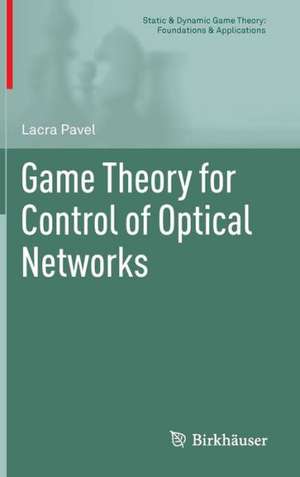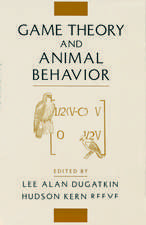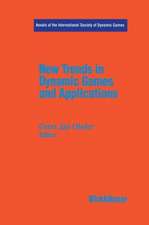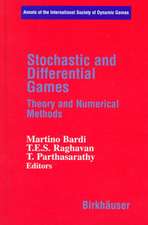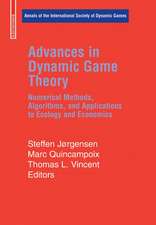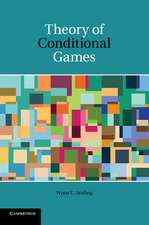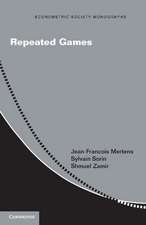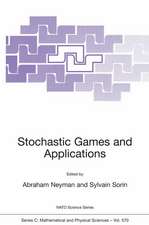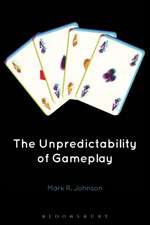Game Theory for Control of Optical Networks: Static & Dynamic Game Theory: Foundations & Applications
Autor Lacra Pavelen Limba Engleză Hardback – 28 apr 2012
With its fresh problem-solving approach, "Game Theory for Control of Optical Networks" is a unique resource for researchers, practitioners, and graduate students in applied mathematics and systems/control engineering, as well as those in electrical and computer engineering.
Preț: 644.18 lei
Preț vechi: 757.85 lei
-15% Nou
Puncte Express: 966
Preț estimativ în valută:
123.27€ • 131.81$ • 102.77£
123.27€ • 131.81$ • 102.77£
Carte tipărită la comandă
Livrare economică 18 aprilie-02 mai
Preluare comenzi: 021 569.72.76
Specificații
ISBN-13: 9780817683214
ISBN-10: 0817683216
Pagini: 261
Ilustrații: XIII, 261 p. 92 illus., 70 illus. in color.
Dimensiuni: 155 x 235 x 20 mm
Greutate: 0.52 kg
Ediția:2012
Editura: Birkhäuser Boston
Colecția Birkhäuser
Seria Static & Dynamic Game Theory: Foundations & Applications
Locul publicării:Boston, MA, United States
ISBN-10: 0817683216
Pagini: 261
Ilustrații: XIII, 261 p. 92 illus., 70 illus. in color.
Dimensiuni: 155 x 235 x 20 mm
Greutate: 0.52 kg
Ediția:2012
Editura: Birkhäuser Boston
Colecția Birkhäuser
Seria Static & Dynamic Game Theory: Foundations & Applications
Locul publicării:Boston, MA, United States
Public țintă
ResearchCuprins
Preface.- 1 Introduction.- Part I Game Theory Essentials.- 2 Basics of Game Theory.- 3 Matrix Games.- 4 Games with Continuous Action Spaces.- 5 Computational Results for Games with Coupled Constraints.- Part II Game Theory in Optical Networks.- 6 Optical Networks: Background and Modeling.- 7 Games in Point-to-Point Topologies.- 8 Games in Network Toplogies.- 9 Nash Equilibria Efficiency and Numerical Studies.- 10 Simulations and Experimental Studies.- Part III Robustness, Delay Effects, and Other Problems.- 11 Robustness and Delay Effects onNetwork Games.- 12 Games for Routing and Path Coloring.- 13 Summary and Conclusions. A Supplementary Material.- B List of Notations.- References.- Index.
Recenzii
From the reviews:
“This is a textbook summarizing current research on game theoretic models for control of optical networks. … The book is a very clear exposition of a very active research area and brings the reader close to state-of-the art. It does a very good job of highlighting the role of game theoretic techniques, often presenting more than one approach or algorithm for a problem, and … it can be used to advantage by an interested researcher without prior exposure to familiarize herself with the broad area.” (Vivek S. Borkar, Zentralblatt MATH, Vol. 1242, 2012)
“This is a textbook summarizing current research on game theoretic models for control of optical networks. … The book is a very clear exposition of a very active research area and brings the reader close to state-of-the art. It does a very good job of highlighting the role of game theoretic techniques, often presenting more than one approach or algorithm for a problem, and … it can be used to advantage by an interested researcher without prior exposure to familiarize herself with the broad area.” (Vivek S. Borkar, Zentralblatt MATH, Vol. 1242, 2012)
Notă biografică
Lacra Pavel is a full-time Professor in the Department of Electrical and Computer Engineering at the University of Toronto. She is a senior member of the Institute of Electrical and Electronic Engineers (IEEE), as well as a member of the IEEE Control Systems Society, Communication Society, Laser and Electro-Optics Society, Society for Industrial and Applied Mathematics, and Optical Society of America. Her areas of specialty center around control systems and communications, fields in which, over the past decade, she has served on many academic committees and review boards for conferences and journals. Dr. Pavel has earned five patents for her work, and published scores of articles and papers in international engineering journals.
Textul de pe ultima copertă
Optical networks epitomize complex communication systems, and they comprise the Internet’s infrastructural backbone. The first of its kind, this book develops the mathematical framework needed from a control perspective to tackle various game-theoretical problems in optical networks. In doing so, it aims to help design control algorithms that optimally allocate the resources of these networks.
The book’s main focus is a control-theoretic analysis of dynamic systems arising from game formulations with non-separable player utilities and with coupled as well as propagated (modified) constraints. Compared with the conventional static optimization approach, this provides a more realistic model of how optical networks operate. Its methods and techniques could be used to improve networks’ functionality and adaptivity, potentially enhancing the speed and reliability of communications throughout the world.
With its fresh problem-solving approach, Game Theory for Control of Optical Networks is a unique resource for researchers, practitioners, and graduate students in applied mathematics and systems/control engineering, as well as those in electrical and computer engineering.
The book’s main focus is a control-theoretic analysis of dynamic systems arising from game formulations with non-separable player utilities and with coupled as well as propagated (modified) constraints. Compared with the conventional static optimization approach, this provides a more realistic model of how optical networks operate. Its methods and techniques could be used to improve networks’ functionality and adaptivity, potentially enhancing the speed and reliability of communications throughout the world.
With its fresh problem-solving approach, Game Theory for Control of Optical Networks is a unique resource for researchers, practitioners, and graduate students in applied mathematics and systems/control engineering, as well as those in electrical and computer engineering.
Caracteristici
Presents a pioneering approach to optical networks Introduces innovative algorithms for resource allocation Provides the potential for improving communications efficiency Includes supplementary material: sn.pub/extras
